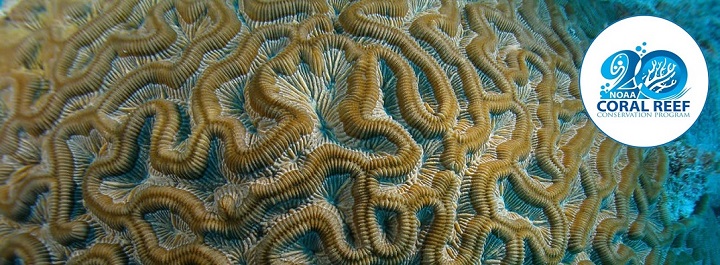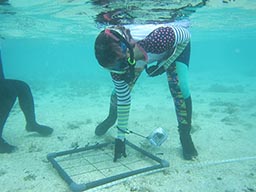- ABOUT US
- PROGRAM AREAS
- CONSERVATION APPROACH
- EDUCATION
- MULTIMEDIA
The Coral Reef Conservation Program Celebrates 20 Years
The Coral Reef Conservation Act was signed into law on December 23, 2000, establishing the NOAA Coral Reef Conservation Program. For 20 years, the program has brought together expertise from across NOAA and its partners to protect, conserve, and restore the nation’s coral reef ecosystems. The program works with state and territorial governments, academic institutions, non-governmental organizations, and community groups to address local issues that affect coral reef ecosystems.

Coral reef ecosystems sustain and protect lives, livelihoods, and coastal property. They support recreational fishing and diving, commercial fishing, and pharmaceutical research, and provide protection from waves and flooding. Each year, coral reefs pump more than $3.4 billion into the U.S. economy.
Coral reefs are threatened by stressors that include land-based sources of pollution, unsustainable fishing practices, and a changing climate. As a result, more than 25 percent of the world’s coral reefs have been lost in the last three decades. There are 22 coral species listed as threatened and three species listed as endangered under the Endangered Species Act.
Yet it’s not too late to save coral reefs. Scientists and conservationists are studying reefs, as well as the most effective ways to reduce the impacts of pollution, unsustainable fishing, climate change, and other threats. Active restoration often helps give coral reefs time to recover from stressors. Through these efforts, corals can continue to prosper for present and future generations.
Follow the celebration on our Facebook and Twitter pages and the National Ocean Service Instagram page all year using the hashtag #NOAACoral20th.
About Us

The NOAA Coral Reef Conservation Program was established in 2000 by the Coral Reef Conservation Act. Headquartered in Silver Spring, Maryland, the program is part of NOAA's Office for Coastal Management.

The Coral Reef Information System (CoRIS) is the program's information portal that provides access to NOAA coral reef data and products.
Work With US
U.S. Coral Reef Task Force
Funding Opportunities
Employment
Fellowship Program
Contracting Assistance
Graphic Identifier
Featured Stories Archive

Access the archive of featured stories here...
Feedback
Thank you for visiting NOAA’s Coral Reef Conservation Program online. Please take our website satisfaction survey. We welcome your ideas, comments, and feedback. Questions? Email coralreef@noaa.gov.
Stay Connected
Contact Us
NOAA’s Coral Reef Conservation Program
SSMC4, 10th Floor
1305 East West Highway
Silver Spring, MD 20910
coralreef@noaa.gov
